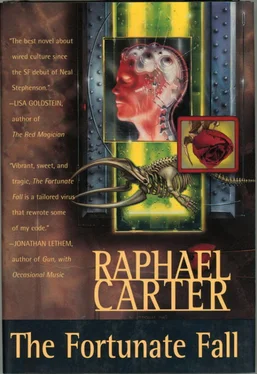Raphael Carter - The Fortunate Fall
Здесь есть возможность читать онлайн «Raphael Carter - The Fortunate Fall» весь текст электронной книги совершенно бесплатно (целиком полную версию без сокращений). В некоторых случаях можно слушать аудио, скачать через торрент в формате fb2 и присутствует краткое содержание. Город: New York, Год выпуска: 1996, ISBN: 1996, Издательство: Tor Books, Жанр: Киберпанк, на английском языке. Описание произведения, (предисловие) а так же отзывы посетителей доступны на портале библиотеки ЛибКат.
- Название:The Fortunate Fall
- Автор:
- Издательство:Tor Books
- Жанр:
- Год:1996
- Город:New York
- ISBN:0-312-86034-X
- Рейтинг книги:3 / 5. Голосов: 1
-
Избранное:Добавить в избранное
- Отзывы:
-
Ваша оценка:
- 60
- 1
- 2
- 3
- 4
- 5
The Fortunate Fall: краткое содержание, описание и аннотация
Предлагаем к чтению аннотацию, описание, краткое содержание или предисловие (зависит от того, что написал сам автор книги «The Fortunate Fall»). Если вы не нашли необходимую информацию о книге — напишите в комментариях, мы постараемся отыскать её.
“Gripping…. One of the most promising SF debuts in recent years”.
—“Publisher’s Weekly” starred review
The Fortunate Fall — читать онлайн бесплатно полную книгу (весь текст) целиком
Ниже представлен текст книги, разбитый по страницам. Система сохранения места последней прочитанной страницы, позволяет с удобством читать онлайн бесплатно книгу «The Fortunate Fall», без необходимости каждый раз заново искать на чём Вы остановились. Поставьте закладку, и сможете в любой момент перейти на страницу, на которой закончили чтение.
Интервал:
Закладка:
“When we first met, you asked me why we don’t remember the Square Miles. Would you like to hear the answer?”
To my surprise, the audience did not protest against this change of subject. I stood up, as slowly as I could, and turned my eyes on him.
“You were on the right track,” he said, “when you compared the Calinshchina to the Holocaust, and to the Terror-Famine. Your error lay in asking what the difference was between these two events. There are many differences, but none is essential. You should have asked, not about the difference in events, but about the difference in ourselves.”
“And what’s that?” I asked, still standing.
“Why, that the Holocaust and Terror-Famine both occurred long before telepresence.”
“The invention of telepresence is an event, isn’t it? I thought this was a difference in us.”
“What is a medium like telepresence but the extension—no, the definition —of ourselves? Are we, who live things at a distance, the same species as our ancestors, who could hear of events in the next town only by going there? If you met a person from that time, would you have any more in common with him than with a whale, or with a chimpanzee? You have traveled to meet me with better than seven-league boots; and I have done more math this morning than Pythagoras, and Euclid, and all Ancient Greece and Rome. Surely, if we are human, they were animals; and we are a race of gods, if they were men.”
“Yes,” I said, and I sat down in the chair he had provided for me, putting my back, once again, to the whale. “I’ve felt that, too. That it changes what we are.”
“Indeed it does, Maya Tatyanichna. It changes the central fact of the human condition: that each of us lives behind one set of eyes, and not another; that our own pain is an agony, and another’s pain only an abstraction we believe in by an act of faith. It makes impossible all the sins of locality, all the errors that arise from being prisoned in one body and no other—as racism, sexism, classism, and of course and especially nationalism.”
“The Africans seem to manage,” I said.
“Come now, Andreyeva, don’t be so historically naive. The Africans are not, and never were, one people. They are fifty nations and a thousand tribes, and it is telepresence that has stitched them into one. His-Majesty-In-Chains has built a wall around his country, yes, but not to keep people out. It is to keep himself in. The Wall of Souls at Suez is the sword in Tristan’s bed: His-Majesty wants desperately to reach across, for he so loves the world that he would not part with a village of it. But he knows he would destroy the thing he touched. He remembers Egypt, and he knows.”
“And he turns away white immigrants because they don’t match the divan.”
“He does not tell us what his plans for us are,” Voskresenye said. “But I assure you that he does not turn us away out of callousness. His-Majesty cannot not empathize, but often, even so, he cannot help. Why do you think he names himself His-Majesty- in - Chains? Fools and children think it is because he is wired to the world’s pain, but that is a lash, not a shackle. The chains are what he locks around himself to keep him from doing more to ease that pain—knowing it would only be worse in the end if he did. But he is patient. The chains give him no choice but to be patient. And he knows that, in the fullness of time, superior technology will tell.”
“Right. Okay. So His-Majesty is just, and people around the world are united by telepresence. So—”
“Ah, but not all people. Some are united, and some separated. We are pulled toward cameras, but away from people that we know in our own lives. Can you watch telepresence with your friend, your wife, your child? Not truly—you may be in the same room, but you are not together. Each is locked in his own dream, even if all are tuned to the same channel. Like movies during the binaural fad: a theater full of people wearing headphones, all hearing the same thing, but separately. And so telepresence causes the triumph of the distant over the near.”
“I seem to recall another medium that two people couldn’t use together. You could look over someone’s shoulder if you wanted, but no two people used it at the same rate or called up the same images. If I remember right, they were called newspapers. ”
“Not the same thing at all, Maya Tatyanichna. Reading is a restricted and an artificial activity. It does not compete with reality because it is nothing like reality. No one could be tempted to think that what happens on the page is more real than daily life.”
I thought of the books in cages, and silently disagreed.
“But telepresence,” he continued, “ is life, except in one respect: it adds a sixth sense, the telepathic, which exists nowhere else. When the telepresence is switched off, you are imprisoned again in your eyes and your ears; the intimacy of mind touching mind is gone.
“We are like men forced to walk about in darkness,” he continued, “except in one chamber where our eyes are uncovered. If the color blue were not found in that chamber, we would never know that it existed; and if in the chamber all men were well-fed, we might forget that there is hunger in the world. The chamber would impress itself upon us so forcefully that nothing else seemed real. And so it is. Telepresence is a chamber in which a new sense, more important than sight, is uncovered. What happens outside that chamber barely exists. And so you see, if what we call reality is to persist, everything must be brought into that chamber.”
“That’s what you’re leading up to? A praise of cabling?” I subvoked to Keishi: I went through all this shit for a cabling commercial I could have downloaded in Leningrad?
“Cabling is, and will always be, a marginal solution,” he said. “The common man will not expose himself that way, nor will he bother with amateur emotions, when he has six thousand channels of slickly post-produced ones at his beck and call. You know as well as I do that the cable results in hate more often than not.”
“And that’s not a sin of locality?”
“It is a sin of nonlocality; it is the agony of solitary animals at being caged together.”
“What?”
“The mind, Andreyeva. It pulls away from other minds that are too near. This is not the same as acting blindly because it knows no other creature than itself; it is the opposite.”
“Look, I don’t think the audience is quite getting this,” I said— and hoped Keishi would screen out the lie; I had not felt incomprehension, or anything else, from the audience in some time. “Give us an example. Let’s go back to where we started: the Calinshchina. Isn’t that distant enough to seem real? It’s in the chamber—it comes in through a socket.”
“But there is no telepresence of it. Telepresence of people talking about it, to be sure, but that is not the same. After all, watching a camera interview someone is no better than talking to her yourself; talk is talk, whatever door it comes in. Bringing a radio into the chamber does not help you see what is outside.”
“You were in a Square Mile,” I said. “If you think telepresence from survivors is so important, why haven’t you volunteered yourself?”
“If it were only a question of volunteering, there would be thousands of hours of disk; there were enough survivors to produce it. Instead there are no disks at all. Is that not suggestive?”
“Suggestive of what?”
“That the Weavers will not permit it to be transmitted.”
My spine stiffened. Oh God, Keishi, tell me you screened that out, I subvoked. She didn’t answer. I prayed it was only because she needed her full concentration to edit the Netcast.
Читать дальшеИнтервал:
Закладка:
Похожие книги на «The Fortunate Fall»
Представляем Вашему вниманию похожие книги на «The Fortunate Fall» списком для выбора. Мы отобрали схожую по названию и смыслу литературу в надежде предоставить читателям больше вариантов отыскать новые, интересные, ещё непрочитанные произведения.
Обсуждение, отзывы о книге «The Fortunate Fall» и просто собственные мнения читателей. Оставьте ваши комментарии, напишите, что Вы думаете о произведении, его смысле или главных героях. Укажите что конкретно понравилось, а что нет, и почему Вы так считаете.












